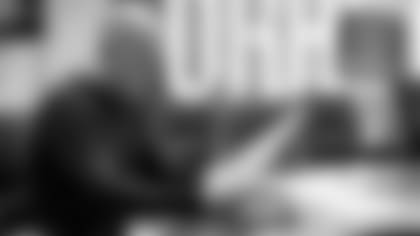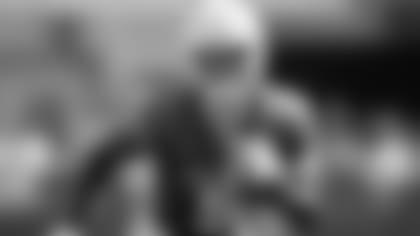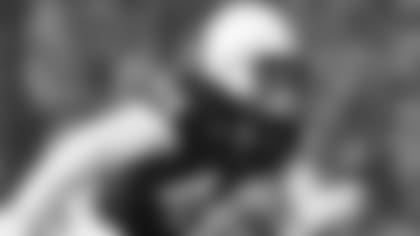Hayden Hurst felt trapped. His right hand was sweaty and shaking. He knows it sounds weird, but it felt like the blood was running from his hand, as if the life were being sucked out of it.
He mentally dissected every movement in his body, thinking about what he could possibly do to fix it at the last second before he was publicly embarrassed.
Hurst brought his left knee up, pushed off the rubber and threw as hard as he could.
Thwack!
The pitch hit the batter in the head at 94 mph. It was a spring training exhibition game against the Baltimore Orioles and Hurst had knocked the guy unconscious.
"I can't do this," Hurst thought. "After that, it got 1,000 times worse."
Fast Track to the Big Leagues
Way before he was a first-round pick of the Ravens and the top tight end in this year's class, Hayden Randle Hurst was a multi-sport monster growing up in Jacksonville, Fla.
He played them all – baseball, football, basketball, hockey and wrestling – but baseball stood out.
During a T-ball game, Hurst threw so hard that the league bumped him up a level because it was concerned for the safety of the other children.
In his freshman year of high school, he was the winning pitcher in the state championship game, was already 6-foot-3 and threw in the 90s. In the summer before his senior year, Hurst pitched at historic Wrigley Field in the Under Armour High School All-American game.
Hurst played one season of high school football his junior year, but he gave it up to focus on what everybody knew was coming: a professional baseball career.
In Hurst's mind, baseball was something he was really, really good at, something he enjoyed and the best avenue to make a lot of money quickly. He wanted to go pro and reach the big leagues as fast as he could.
Hurst was offered a full ride to play baseball at Florida State, but he was also told he could be a late first-round pick in the MLB draft, which would come with a signing bonus in the millions at 18 years old.
When Hurst didn't get picked until the 17th round (of 40) of the 2012 Draft, it was a huge disappointment. According to his father, Jerry Hurst, their agent scared teams off by saying Hayden wasn't going to sign for anything less than a million. Teams thought he intended to go to college and didn't want to waste a high pick.
The Pirates took a chance, and at 11:15 p.m., 45 minutes before the deadline to sign draft picks, they finally gave in to Hurst and his father's contract demands of a $400,000 signing bonus. He was now a professional baseball player.
After Hurst inked his first professional contract, a thought popped into Jerry's mind as they rehashed the decision to go pro straight from high school. If the whole baseball thing didn't work out, Hurst could always go to college and play football.
"At 18, that wasn't my thought," Hurst said. "I was going to go pitch in the Major Leagues."
That is, until he caught a case of the yips.
The Wheels Came Off
When Hurst arrived with the Gulf Coast League Pirates in Bradenton, Fla, he was nearly 6-foot-5 and hurled the ball 97 miles per hour. He had all the tools to be a star and potential late-round steal for the Pirates organization.
Hurst's teammates, however, told him he was a football player playing baseball. He just got on the mound and tried to throw as hard as he could. Plus, he enjoyed the weight room way more than your typical baseball player.
"My buddies would see me on the bench press and say, 'What are you doing here?'" Hurst said.
Even Jerry recognized that his son had a different mentality than most pitchers. He was so intense, so aggressive. It's a great attitude for football, but not so much for pitching.
"He'd walk a guy and now he's breathing fire," Jerry said. "The next pitch is coming 90-some miles per hour, but where's it going?"
It didn't take long for Hurst to also start feeling like he didn't belong.
One day that fall, he was having a catch with a teammate and threw the ball over his head. Then he did it again and again. Something was off.
When he was getting warmed up for his first start in the Gulf Coast League in 2013, Hurst felt nauseous. Maybe it was just the jitters, which would be totally understandable. But he didn't feel right.
That day, on June 24, 2013, Hurst faced five batters. He walked them all and threw two wild pitches. He didn't know it yet, but those were both the first and last pitches he would ever throw in a professional game.
"The wheels came off," Hurst said. "I can't really explain it. It just happened out of nowhere."
Hurst had the yips. For those not familiar with the term, the yips are defined as "a state of nervous tension affecting an athlete in the performance of a crucial action."
The yips plagued hard-hitting All-Star Steve Sax for several years. They essentially ended four-time All-Star Chuck Knoblauch's career because the former Gold Glove second baseman in the league couldn't throw to first base. They sunk their teeth into pitching phenom Rick Ankiel in the playoffs, forcing him to convert to outfielder, where he found second life.
It's something psychological that manifests itself in the physical. Suddenly, a player totally loses control. Public embarrassment ensues, which just makes it worse. The doubts double, then triple. It's a downward, awful spiral.
When a sports psychologist in the Pirates organization recommended that Hurst start to keep track of his feelings in a journal, he often ended entries with, "One day at a time."
Hurst saw countless doctors, sports psychologists and baseball advisors who thought they had the remedy. He even gave hypnosis a try. The cost was burning through that signing bonus real fast.
Hurst began working with Scott Elarton, a former Major League pitcher who lasted more than a decade in the game before becoming the Pirates' Gulf Coast League pitching coach. While other coaches had little patience and even worse bedside manner, Elarton had a softer touch.
For years, the two met on the field an hour or two before practice to work on Hurst's problem. That way, he didn't have to feel the embarrassment of others watching.
They tried everything. Hurst would stand on the white chalk and throw at the foul pole, which gave a rewarding ring when he was successful. He counted every movement of his delivery to try to get his mind off the final release. He threw at huge targets that gradually narrowed. Elarton experimented with using different weighted balls.
But when Hurst would come anywhere close to the mound, he'd lose it all over again.
"One of the hardest parts was we would feel like we were making a little progress and then it would get blown out of the water," Elarton said. "That was time after time after time. Each time that happened, it got worse and worse."
The Battle Inside Your Head
Hurst's family, of course, knew of his horrific first pitching outing, but he didn't share how tough it was on his mental well-being.
He started calling his dad randomly to see if he would drive the four hours from Jacksonville to Bradenton to hang out or play some golf. That was odd, Jerry thought, because Hurst was usually a very independent person.
Hurst now says, without a doubt, that he was in a depression. His uncle and cousin both struggled with depression and both committed suicide.
Not only did he hide his feelings from his family, but Hurst was also isolated by his teammates. They were so spooked that they didn't want to be near him while he pitched because they feared his yips could spread like a disease. Hurst was alone with his thoughts.
"It's a battle inside your head every single second of the day," Hurst said. "You second-guess what you're doing, why you're doing it, why this is happening to you.
"There was a failure of letting my family down. But I think as much as I didn't want to disappoint my family, I didn't want to disappoint myself. I never want to fail at anything; that's just the competitor and man that I am."
So he kept working … and working. Elarton has since coached other players who had the yips. None tried to conquer the affliction as long as Hurst did.
"It's so mentally exhausting that it eventually becomes not worth the toll that it takes on you," Elarton said.
Some other players, such as Ankiel, got past the yips because they switched positions. It's a lot easier to hide throwing problems when you're not the pitcher.
Hurst gave that a try, too. In 2014, he converted to being a first baseman, but wasn't a good enough hitter to make it work. He batted .245 with two RBIs and no home runs in 60 plate appearances.
The 2015 spring training was his last shot, and he was again taking some positive steps. Hurst summoned his courage and stepped back on the mound. He spiked pitches into the dirt, then sailed one into the fence.
"I just dropped my glove, walked inside and cried," Hurst said.
Elarton joined him. The two sobbed together. They had tried everything and nothing worked.
"It was a monumental struggle," Elarton said. "There was no light at the end of the tunnel."
Throughout the entire process, Elarton would ask Hurst what he was passionate about. His answer would always be the same: football. Finally, Elarton had seen enough. Go play football, he said.
"The first time I heard about football, I thought it was just frustration coming out and second-guessing," Elarton said. "When it started to come out more and more, I could tell that was his primary passion."
Hurst battled the yips for three years. The day he decided to pull the plug was the best day of his professional baseball career.
"It was such a huge relief to him," Elarton said. "He almost seemed like a different guy. He had become pretty beaten down. To finally give it up and walk away was like getting out of jail."
Hurst called his father and asked if he could drive down to Bradenton to talk to him and Elarton. For the first time, Hurst spilled the beans on the extent of his pain to his father.
Father and son got in the car and talked. They drove to Sarasota, then down the beach to Siesta Key. After that car ride, Jerry knew it was time.
They stopped in a parking lot near the beach and called Pirates Minor League Director Larry Broadway to announce Hayden's retirement. "Well good," Broadway said. "I hope you find something in your life that you can stick with."
Brutal.
"It was the best thing because Hayden never forgot that," Jerry said. "That really drove him, that statement. Larry didn't realize how much he was really helping him."
Finding His Passion, Releasing the Badass
That day, Hurst went back home to Jacksonville and got on the phone with a high school buddy, Perry Orth, who was a backup quarterback at South Carolina. He said they didn't have many tight ends, and he was confident Hurst could play.
"I always thought of baseball as more of a financial outlet and football being this raw sport that I was good at and was really fun," Hurst said. "I always had this raw passion for it."
Baseball was the smart decision. Football was the heart decision.
Jerry had played high school football and coached it for years after college. He knew his son could make the transition and that the yips wouldn't follow.
"When you're the pitcher, you're there front and center. The whole game is in your balance," Jerry said. "And it's such a methodical, slow game. There's so much time to think, and sometimes you think yourself right into trouble. Football doesn't offer that. It's quick, violent, way faster paced."
They didn't have too tough a time finding somebody to give him a chance. Hurst grew up going to University of Florida football games, so that was his first choice. But the Gators ultimately passed on him. Orth convinced South Carolina assistant coach Steve Spurrier Jr. to take a look at Hurst.
Spurrier came to Jacksonville in the middle of May, where Hurst was working out at his old high school. Spurrier saw his size, watched him run some routes and offered him a preferred walk-on spot.
Hurst started to feel like a football player again immediately when he stepped onto the field as a 21-year-old freshman. He didn't have a grasp of the Xs and Os, but that came quickly, too. Nobody outworked him in the classroom, practice field or weight room.
He was originally a wide receiver, but when Will Muschamp replaced Steve Spurrier Sr. as head coach, Hurst was moved to tight end. It was the perfect position for his size, physicality and speed. He went from 225 pounds to 250 and topped 400 pounds on the bench press.
In his second year, Hurst was put on scholarship. He also became the first sophomore in South Carolina history to be voted a team captain.
He caught 92 passes for 1,175 yards and three touchdowns over the next two seasons. He was named to the first-team All-SEC and declared for the draft at 24 years old. Because of his abilities as a pass-catcher and blocker, he was the top tight end in the class despite just two years playing the position.
"His biggest attribute to me is his competitive edge and his work ethic," Muschamp said. "This guy's going to work. He's going to be a very productive player in the National Football League."
Hurst had found an outlet for his aggression. If he got angry on the field, he just physically manhandled his opponent on the next play. As a pitcher, he had often written in his journal about searching for the "badass" inside himself. On the football field, he found it again.
He was happy. The Pirates had made him keep his hair short. Now he had long, flowing red hair and was beloved by the South Carolina fans, who nicknamed him "Garnet Thor."
While some pundits knocked Hurst because of his older age, Hurst looks back on his path and baseball career as a positive. It made him stronger, more resilient.

No Fear
The projections for Hurst in the NFL Draft were the same as they had been in the MLB Draft – late first, early second round. Thus, he wasn't exactly at ease on draft night.
After trading back twice in the first round of his final draft as general manager, Ozzie Newsome selected Hurst with the 25th-overall pick. On the other end of the phone, Hurst sat with his family at home in Florida and choked up with tears.
"I couldn't be happier," Hurst said. "You got it right. I promise you."
(Funny enough, Elarton had been selected by the Houston Astros with the 25th-overall pick in the 1994 MLB Draft.)
The Ravens viewed Hurst's baseball experience as a strength because he had overcome so much adversity already. They knew he could take on the challenges of the NFL.
In fact, Assistant General Manager Eric DeCosta had read Ankiel's book, "The Phenomenon: Pressure, the Yips, and the Pitch That Changed My Life." Unbeknownst to DeCosta, Hurst is also reading it (he's on Chapter 3).
"I don't believe he'll be flustered or overwhelmed by the NFL," DeCosta said. "For any player, if they've overcome adversity before they come here, to me, that's a positive quality."
As he sets to embark on his rookie season, Hurst has a maturity most rookies don't possess. For example, he was the only first-round pick DeCosta could remember who showed up to his first day on campus without his family in tow.
"I learned a lot about myself, and it made me the person that I am today," Hurst said. "I'm a very, very strong person. Those three years were pretty miserable, and I think a lot of people would have given up much earlier. As bad as it all was, I appreciate it now."
Hurst and his mom are also already working on launching a charity to help people battling mental health problems.
"I struggled through a lot of depression and dug my way out my own way," Hurst said. "In today's day and age, mental health is a taboo topic. Nobody wants to talk about it. But I have no fear talking about it."
After what he went through, Hurst doesn't fear much of anything.




















